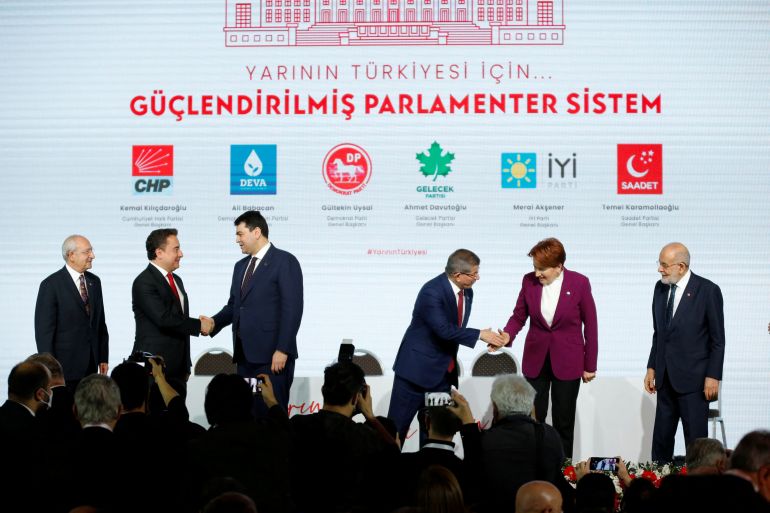Turkish opposition parties promise return to parliamentary system
A plan signed by six opposition party leaders aims to entirely overhaul the existing executive presidential system.

Leaders of six opposition parties in Turkey have signed a joint declaration outlining their plan to restore parliamentary system and strip the powers of the president if they win 2023 elections.
The plan aimed to entirely overhaul the existing executive presidential system, which has been backed by President Recep Tayyip Erdogan and his allies, and in force since June 2018.
Keep reading
list of 4 itemsTurkey’s Erdogan says social media a ‘threat to democracy’
Turkey’s Erdogan replaces finance minister amid economic turmoil
Why is Turkey’s lira crashing and will currency crisis worsen?
A 48-page document covering 23 articles was signed on Monday by the leaders at a large event organised in a hotel in the capital Ankara.
Kemal Kılıcdaroglu, the leader of the main opposition Republican People’s Party (CHP), Ali Babacan who heads the Democracy and Progress Party (DEVA), Gultekin Uysal of the Democrat Party (DP), Ahmet Davutoglu who leads the Future Party (FP), Meral Aksener of the IYI (Good) Party and Temel Karamollaoglu, the leader of the Felicity Party (SP), gathered to sign the document.
Davutoglu and Babacan were close allies of Erdogan in the past and served in top posts before leaving his Justice and Development (AK) Party because of policy disagreements.
Speaking at the event, CHP Deputy Chairman Muharrem Erkek said that the agreed upon plan was a new beginning.
“We will crown Turkey’s deep-rooted state and republican experience with democracy,” he said, adding that the current system introduced an “arbitrary governance”.
DEVA Deputy Chairman Mustafa Yeneroglu said that the proposed system sought to enhance the functionality of the parliament while improving its legislative capacity.
‘History does not flow backwards’
Meanwhile, officials from Erdogan’s party slammed the joint declaration by the opposition as “deplorable”.
Senior AK Party official Bulent Turan said six parties that signed the document had nothing in common in terms of their ideology or political views apart from one.
“Their only common aspect is their yearning for old Turkey. No nation willingly gave away their achievements. The course of history does not flow backwards,” he said.
Omer Celik, the AK Party spokesman, said that the six parties sought to extort the national will of the people as it was done in recent Turkish history, apparently referring to the army’s influence and interventions in Turkish politics.
Narrowly passed, a referendum held in April 2017 approved major constitutional changes, empowering the next president – elected in June 2018 – with significant executive powers as it abolished the prime ministry and removed the monitoring role of parliament, among other changes.
Under the current system, the president can appoint vice presidents, ministers, high-level officials and senior judges, as well as dissolve parliament, issue executive decrees and impose a state of emergency.
The text agreed by the six parties explains the proposed system under six chapters: Executive, legislation, justice, accountability and democratic state with rule of law.
A seven-year one-term term is suggested in the declaration for the president which is to merely have symbolic powers as opposed to a maximum of two five-year tenures in the current system.
The executive power will be held by the council of ministers led by the prime minister. The opposition also seeks to decrease the election threshold to 3 percent from the current level of 10 percent.